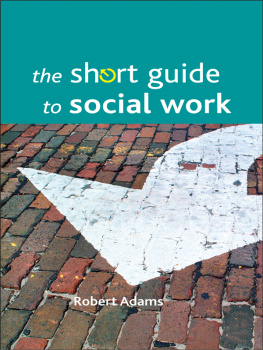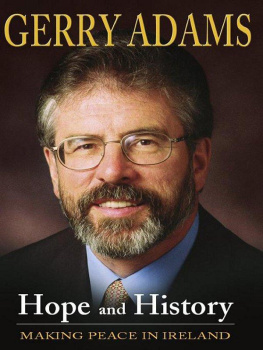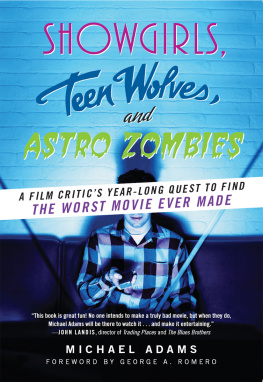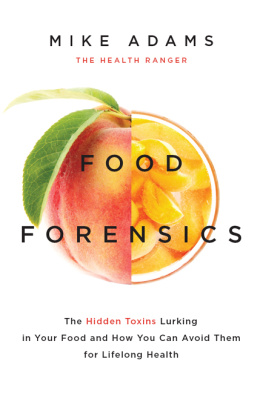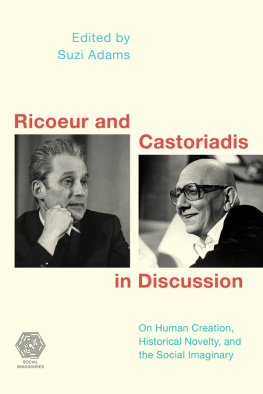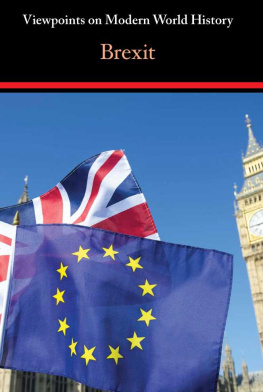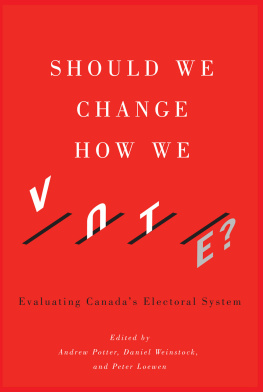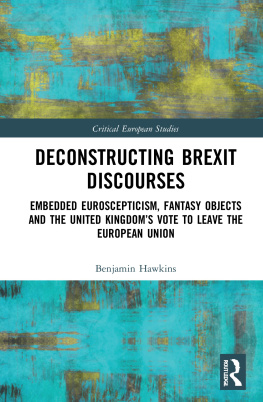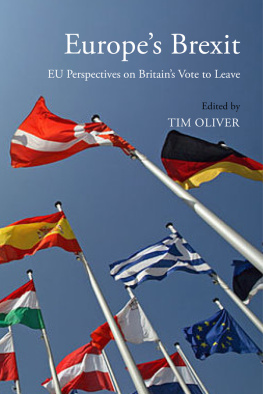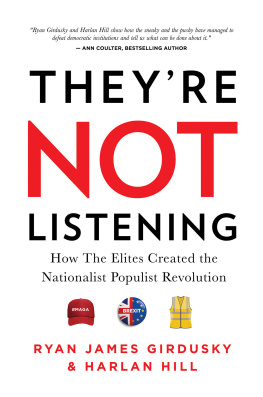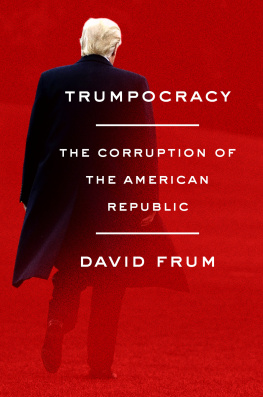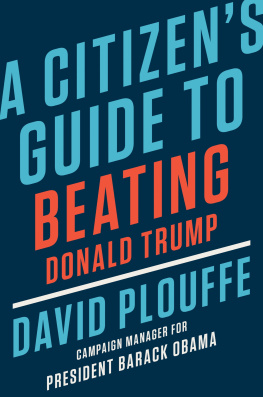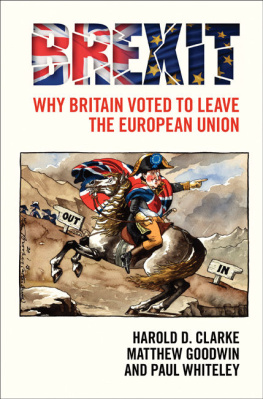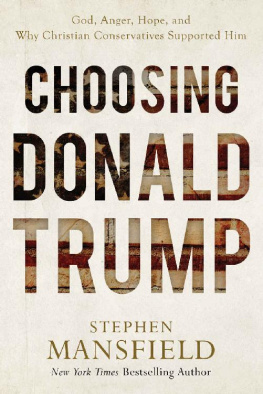Thank you for downloading this Simon & Schuster ebook.
Get a FREE ebook when you join our mailing list. Plus, get updates on new releases, deals, recommended reads, and more from Simon & Schuster. Click below to sign up and see terms and conditions.
CLICK HERE TO SIGN UP
Already a subscriber? Provide your email again so we can register this ebook and send you more of what you like to read. You will continue to receive exclusive offers in your inbox.
We hope you enjoyed reading this Simon & Schuster ebook.
Get a FREE ebook when you join our mailing list. Plus, get updates on new releases, deals, recommended reads, and more from Simon & Schuster. Click below to sign up and see terms and conditions.
CLICK HERE TO SIGN UP
Already a subscriber? Provide your email again so we can register this ebook and send you more of what you like to read. You will continue to receive exclusive offers in your inbox.
A LSO BY M ICHAEL A DAMS
Stayin Alive: How Canadian Baby Boomers Will Work, Play, and Find Meaning in the Second Half of Their Adult Lives
Unlikely Utopia: The Surprising Triumph of Canadian Multiculturalism
American Backlash: The Untold Story of Social Change in the United States
Fire and Ice: The United States, Canada and the Myth of Converging Values
Better Happy Than Rich? Canadians, Money and the Meaning of Life
Sex in the Snow: The Surprising Revolution in Canadian Social Values

Simon & Schuster Canada
A Division of Simon & Schuster, Inc.
166 King Street East, Suite 300
Toronto, Ontario M5A 1J3
www.SimonandSchuster.ca
Copyright 2017 by Michael Adams
All rights reserved, including the right to reproduce this book or portions thereof in any form whatsoever. For information, address Simon & Schuster Canada Subsidiary Rights Department, 166 King Street East, Suite 300, Toronto, Ontario, M5A 1J3, Canada.
This Simon & Schuster Canada edition September 2017
SIMON & SCHUSTER CANADA and colophon are registered trademarks of Simon & Schuster, Inc.
For information about special discounts for bulk purchases, please contact Simon & Schuster Special Sales at 1-800-268-3216 or CustomerService@simonandschuster.ca.
Library & Archives Canada Catalog-in-Publication
Adams, Michael, 1946 Sept. 29, author
Could it happen here? / Michael Adams.
Issued in print and electronic formats.
ISBN 978-1-5011-7742-2- (hardcover).ISBN 978-1-5011-7744-6 (ebook)
1. Social surveysCanada. 2. Social predictionCanada.
3. PopulismCanadaForecasting. 4. Social valuesCanada.
5. Demographic surveysCanada. 6. CanadaEconomic
conditions21st century. I. Title.
HN110.Z9S67 2017 303.4971 C2017-902218-0
C2017-902219-9
ISBN 978-1-5011-7742-2
ISBN 978-1-5011-7744-6 (ebook)
To Thuy Thi Nguyen
Preface
I have spent much of my adult life studying Canadian exceptionalism from the perspective of survey research, drawing on Environicss extensive archive of polling of values, attitudes and opinions going all the way back to the mid-1970s. My curiosity about my own country led me to wonder how Canadians differed from our cousins in the United States and Europe. This curiosity inspired me to publish my first book, in 1997, Sex in the Snow: The Surprising Revolution in Canadian Social Values. That book drew on annual social values surveys conducted in Canada since 1983 and a couple of surveys conducted in the U.S. in 1992 and 1996, presidential election years. Sex in the Snow documented the evolution of Canadian social values from deference to authority to questioning authority, from patriarchy to gender equality, from fear and judgment of others to openness to others, from deferred gratification to immediate gratification, from the consumption of material symbols of status and success to a postmaterial orientation to learning and experience seeking, and from a reliance on religious authority for meaning to a more philosophical and personal spiritual quest.
Fire and Ice: The United States, Canada and the Myth of Converging Values was published in 2003. That book was firmly focused on the revolutionary and counterrevolutionary cousins in North America. It was based on our annual Canadian survey program up to 2000 and the relatively newer U.S. program, drawing on the surveys conducted in 1992 and 1996, as well as a third in 2000. Fire and Ice demonstrated, at least to my satisfaction, that Canadian and American social values were divergingnot converging as both elites and the Canadian public at large assumed. Among other surprising findings that book reported was a growing orientation to patriarchy in the United States. In 1992, 42 per cent of Americans agreed that the father of the family must be master in his own house; the proportion had risen to 48 per cent by 2000 as Americans were about to choose Bill Clintons successor, George W. Bush. In Canada, the proportion over that eight-year period had dropped from 26 per cent to 18 per cent.
Jump forwards a decade and a half, and the world around us seems very different from the world of the 1990s documented in my early books. Our international scene is convulsed by terrorism, thousands of refugees are making perilous flights from war and oppression, and populist political uprisings are shocking experts and unnerving moderates of all persuasions. Canada appears placid, at least on its surface. As the U.S., Britain and other societies retrench, the international media have taken notice of Canadas apparent calm. After nearly two years in power, Canadas centrist Liberal government continues to enjoy majority approval, suggesting an electorate not as bitterly split as those elsewhere. Open on immigration, rational on climate, and unapologetic on gender equity, the Trudeau Liberals cleave to principles that seemed relatively safe in many Western societies only a few years ago but are under threat in many places today.
As skeptics point out, however, Brexit and a Trump presidency were unthinkable until they happened, and Canada is not immune to the forces of populism, social fracture and backlash. A massacre at a Quebec City mosque offered a grim window onto an extremist subculture. At least two Conservative leadership candidates drew inspiration from the Trump worldview. Opinion polls show anxiety among Canadians about the cultural integration of newcomers.
The evening of November 8, 2016, was my tipping point. As Pennsylvania, Michigan and Wisconsin appeared set to give Donald Trump his electoral college victory, I knew I had to revisit the questions that had inspired my earlier efforts to share our social-values research with Canadian readers. What was the survey data saying? Were we at risk of coming down with the malaise affecting other Western democracies? The next day I rushed into the office to ask for the results of the survey of eight thousand Americans and four thousand Canadians that had just come out of the field. The question on my mind was one that many Canadians have asked since thenin the media, at the bar and around the dinner table: Could it happen here? This book is my answer.
INTRODUCTION
Could It Happen Here?
W hen Conservative MP Kellie Leitch launched her long-shot, and ultimately unsuccessful, bid to replace Stephen Harper as party leader, she was making a bet. Leitch positioned herself as a clarion for those Canadians who felt alienated and angry about high levels of immigration from non-European, non-Christian countries, as well as an influx of refugees from war-ravaged Syria. It was an overt appeal to the sort of nationalist populism that has gripped much of the West in the past two or three years. For a time, Leitchs views garnered a lot of attention, and it even looked like she could emerge as the winner of the epic campaign to succeed Harper.
Next page

